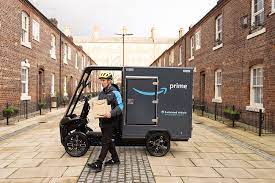In the fast-paced world of urban living, the demand for quick, reliable, and efficient delivery services is higher than ever before. As cities continue to grow and evolve, so does the complexity of delivering goods to consumers in the final leg of the shipment’s journey. This is where final mile delivery comes into play, a pivotal component of modern logistics that’s reshaping the urban landscape and the way we perceive the delivery of goods. In this comprehensive exploration, we delve into the intricacies of final mile delivery, its impact on urban life, and how it’s setting new standards for logistical operations.
The Evolution of Final Mile Delivery
Final mile delivery, also known as last-mile delivery, refers to the final step of the delivery process—the movement of goods from a transportation hub to the final delivery destination, typically a personal residence or business. This leg of the journey might seem short, but it’s the most crucial and often the most complex part of the logistics chain.
The Rise of E-commerce and Its Impact
The exponential growth of e-commerce has been a significant driver behind the evolution of final mile delivery services. As more consumers turn to online shopping for its convenience and variety, the pressure on delivery networks to perform efficiently has intensified. This surge in demand has led to innovative solutions designed to streamline final mile operations and enhance customer satisfaction.
Technological Advancements in Logistics
Technological advancements have played a pivotal role in transforming final mile delivery. From sophisticated tracking systems to the use of drones and autonomous vehicles, technology is making deliveries faster, more reliable, and more transparent than ever before. These innovations not only benefit consumers but also help businesses optimize their operations and reduce costs.
Challenges of Final Mile Delivery in Urban Areas
Urban environments present unique challenges for final mile delivery, including congested traffic, limited parking, and complex building layouts. These obstacles can lead to delays and increased delivery costs, affecting both businesses and consumers.
Addressing Urban Logistics Challenges
To overcome these challenges, companies are implementing creative strategies, such as using micro-fulfillment centers located closer to consumers and leveraging electric bikes and scooters for more agile delivery in congested areas. Such approaches not only improve efficiency but also contribute to sustainability efforts by reducing carbon emissions.
The Role of Final Mile Delivery in Enhancing Customer Experience
The final mile delivery experience significantly influences customer satisfaction and loyalty. In today’s market, consumers expect not just speed but also flexibility and transparency in their delivery options.
Personalization and Convenience
Offering personalized delivery options, such as scheduled delivery slots and real-time tracking, enhances the customer experience. By providing consumers with control over their delivery preferences, businesses can increase satisfaction and encourage repeat purchases.
The Impact on Consumer Behavior
The efficiency of final mile delivery services also affects consumer behavior, with more people willing to shop online knowing their purchases will arrive swiftly and securely. This shift has led to increased opportunities for businesses across various sectors, from retail to groceries and beyond.
Sustainability and Final Mile Delivery
As environmental awareness rises, the sustainability of logistics operations has come under scrutiny. Final mile delivery, with its potential for high emissions and resource use, is a focal point for improvement.
Green Delivery Solutions
In response, companies are exploring eco-friendly delivery options, such as electric vehicles and optimized route planning, to minimize environmental impact. These efforts not only contribute to a healthier planet but also resonate with eco-conscious consumers, further enhancing brand loyalty.
The Future of Final Mile Delivery
The landscape of final mile delivery is continuously evolving, with emerging technologies and changing consumer expectations driving innovation in the sector. The future promises even more personalized, efficient, and sustainable delivery solutions, transforming urban life in ways we are only beginning to imagine.
Embracing Innovation
As we look ahead, the integration of artificial intelligence, machine learning, and blockchain technology in final mile logistics will further optimize delivery processes and enhance security. These advancements will redefine what’s possible in logistics, setting new benchmarks for speed, efficiency, and customer satisfaction.
Conclusion
Final mile delivery is more than just a logistical challenge; it’s a critical element of modern urban life, influencing everything from consumer behavior to environmental sustainability. By addressing the unique challenges of urban logistics, leveraging technological advancements, and prioritizing customer experience, final mile delivery is not only meeting but exceeding the demands of today’s fast-paced world. As we continue to innovate and adapt, the future of urban logistics looks brighter than ever, promising a new era of convenience, efficiency, and sustainability. In the realm of final mile delivery, we are truly witnessing the transformation of urban life, one delivery at a time.
